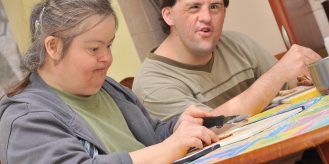MJB established the Center for Research on Disabilities in 1993 to address the full range of disabilities including visual, auditory, mental health, physical, intellectual, learning disabilities and attention-deficit disorders, as well as chronic illnesses that limit one’s ability to work. The Center was founded in response to national policy efforts to address the employment and social service needs of people with disabilities, but equally important, the research itself helped to put new issues on the national agenda.
A major landmark in the expansion of its program was reached with the establishment in 1999 of the Mandell Berman Fund for Research on Children with Disabilities, by long-time MJB Board member Bill Berman. The Berman Fund has enabled MJB to create a critical mass of studies that have made a tangible difference in the opportunities and education, health, and social well-being of Israeli children with disabilities and their families.
Children with Disabilities
The Berman Fund supported the first national survey of children with disabilities and their families in 1999. Undertaken along with Israel’s Social Security Administration (SSA), the survey provided the first comprehensive data on the extent of children with disabilities in Israel, the nature of their needs, and the gaps in services for them.
The survey findings had significant and broad impact on national legislation. The SSA soon expanded its eligibility criteria for child disability benefits, increasing the number of eligible families by 20 percent. The government also expanded the eligibility for rehabilitative services to include older children, a significant change for those whose disabilities emerge at a later age, such as ADHD.
The new awareness of the needs of children with disabilities also spurred changes in the education system. During the 1990s and into the 2000s, MJB worked closely with the Ministry of Education to implement the Special Education Law. The Institute helped the Ministry develop more equitable funding formulas to provide specialized equipment for students with disabilities in special education schools. MJB also launched a series of studies on effective ways of mainstreaming students with disabilities into regular classrooms, research that contributed to the amendment to the Special Education Law in 2003 that promoted mainstreaming.
This work continues today, with the Institute recently participating in a national committee to update a formula for assessing the needs of children with disabilities mainstreamed into regular schools. This assessment determines the funding allocations for each student, and will help the Ministry of Education better support the mainstreaming process.
MJB’s national survey led to new initiatives focusing on the emotional, physical, and financial needs of parents caring for a child with disabilities. The Institute undertook a number of studies to examine the adequacy of existing support services and identify effective service models. Many of these models were developed by JDC-Ashalim, which drew heavily on the Center’s research on the strong link between disabilities and levels of risk.
Of particular note was MJB’s evaluation of family support centers that provide a range of services and information for parents of children with disabilities. The centers were developed by JDC-Ashalim to provide a holistic model for these families. The Ministry of Social Affairs drew on the evaluation findings in its decision to implement a national network of centers.
Arab-Israeli Children with Disabilities
The Institute’s 1999 national survey revealed a dramatic gap in services between the Arab and Jewish sectors. These findings helped to raise public awareness and led to new efforts to expand services for Arab children with disabilities.
A milestone in this area was MJB’s development in 2003 of a model for coordination among organizations providing services to children with special needs in the Arab village of Dir Hanna. The MJB coordination model not only helped to improve the lives of the families and children in Dir Hanna, but also was acknowledged to be an effective model relevant to all Jewish and non-Jewish communities in Israel. This model was subsequently adopted by Israel Unlimited and JDC-Ashalim for their own programs to promote coordination of services.
The Center has also worked closely with Bedouin communities in the Negev, where services for children with disabilities have been particularly underdeveloped. In 2008, the Center published a special survey of Bedouin in the Negev . Conducted in partnership with Prof. Alean Al-Krenawi of Ben Gurion University, a leading member of the Bedouin community, the study provided the first comprehensive view of the world of Bedouin children with disabilities and their families. It contributed to the Ministry of Social Affairs’ effort to create a comprehensive master plan for social services for the Bedouin, now being implemented by the government.
Adults and Young Adults with Disabilities
Over the years, the Center’s research on adults with disabilities has contributed to the expansion of opportunities for this population, particularly in the area of employment.
In the early 2000s, the Center conducted a series of studies on adults who received disability benefits, and the effect of the benefits system on their participation in the labor force. MJB served as the professional advisor for the national Laron Commission, helping to develop recommendations to significantly restructure disability benefits in order to provide greater work incentives and employment supports. A subsequent multi-year evaluation of the implementation of the Laron recommendations has helped to refine the incentives to make them more effective.
The resulting increased national attention spurred the development of new programs to meet the needs of adults with disabilities. The Center worked closely with the government and JDC-TEVET to evaluate new program models, such as supported employment programs and programs specifically designed for adults with autism and Asperger syndrome.

Beyond employment, the Institute has impacted on other areas of importance to adults with disabilities:
- The first national survey of the transition to adulthood of young adults with disabilities in 2012 highlighted the challenges they face
- A 2015 survey of individuals with an intellectual disability helped the Ministry of Social Affairs refine its service delivery strategies in order to increase awareness of and accessibility to its services
- A national study of military veterans with disabilities identified their unique needs as they age, and helped the Ministry of Defense develop specialized services for this population
- The development of a national regulatory system for guardians of people with disabilities and the elderly is being undertaken currently.
The cumulative knowledge gained from the Institute’s research on disabilities played an important role in JDC’s establishment in 2010 of Israel Unlimited, a strategic partnership with the government and the Ruderman Family Foundation to advance the independence and integration of Israelis with disabilities. MJB has worked closely with Israel Unlimited, developing detailed analyses of the needs of Israelis with disabilities, evaluating key programs, and helping to prepare multi-year strategic plans.
MJB has also contributed to JDC’s worldwide program for people with disabilities. Most notably were studies of Jewish adults with disabilities in the former Soviet Union , conducted with the support of the Ruderman Foundation. The studies helped to expand awareness of the needs of people with disabilities in this region.
Current Directions
Looking broadly at the social policy landscape, Dori Rivkin, Director of the Center for Research on Disabilities, sees a clear shift underway towards holistic solutions that focus on the whole person and that emphasize service integration. “This policy shift is reflected in our research program,” she explains, “with more studies of interministerial initiatives and programs that cut across different disciplines within MJB.”
One example of this integrated perspective is the Center’s recent publication, People with Disabilities in Israel , in cooperation with the Ministry of Justice’s Commission for Equal Rights of Persons with Disabilities. This is an up-to-date and comprehensive resource for policy makers and service planners looking to effect changes in all of the major aspects of integration of people with disabilities into society. An updated report will be released in 2017.
Another important direction is the effort to launch a new national survey of children with disabilities. The 1999 survey described earlier continues to be the primary source for Israel’s service system. “The fact that Israel is still relying on data that is more than 15 years old points to the glaring need for updated data that reflect many changes that have occurred since the original survey.” MJB is making efforts to form a consortium to fund this important project.



